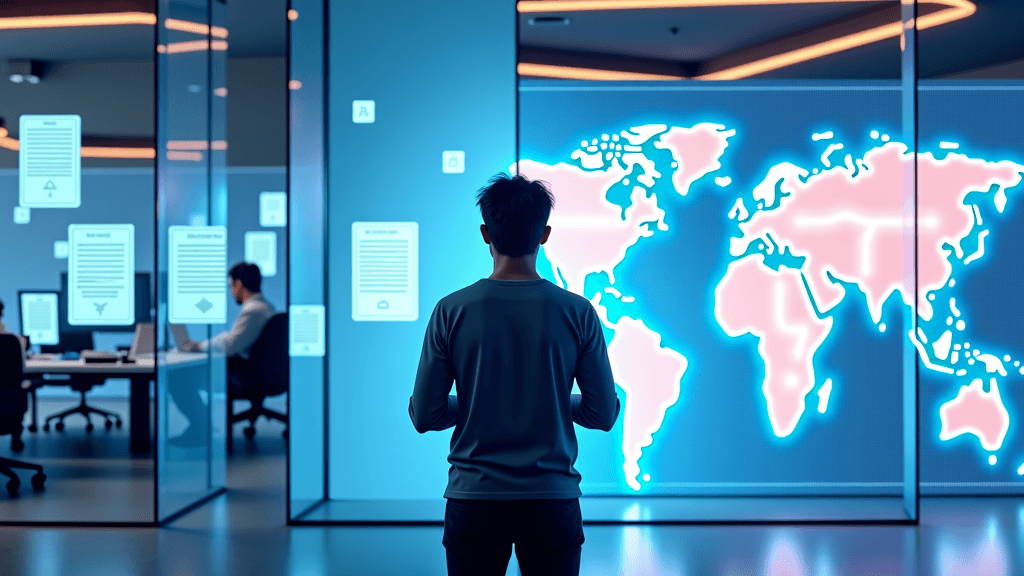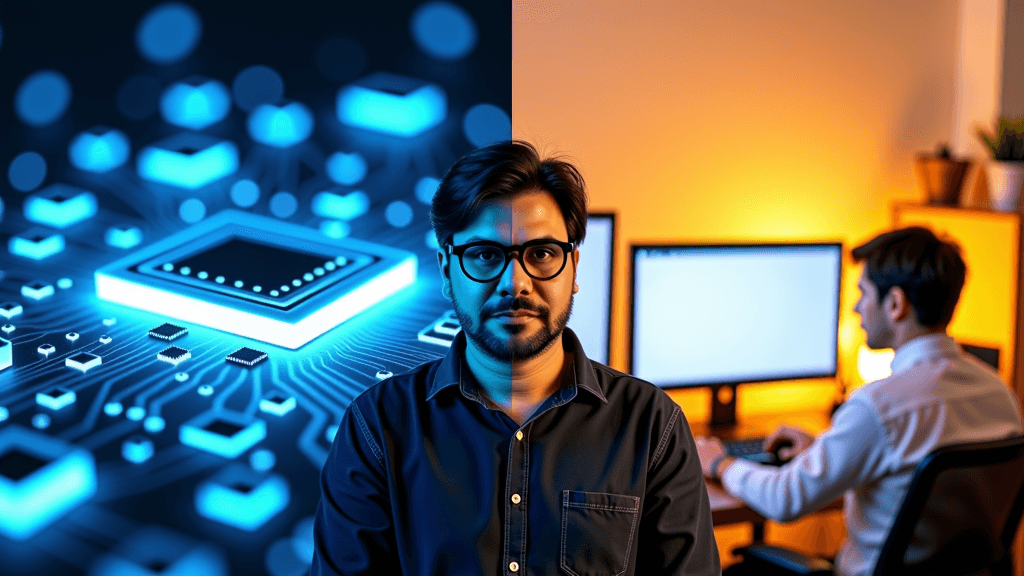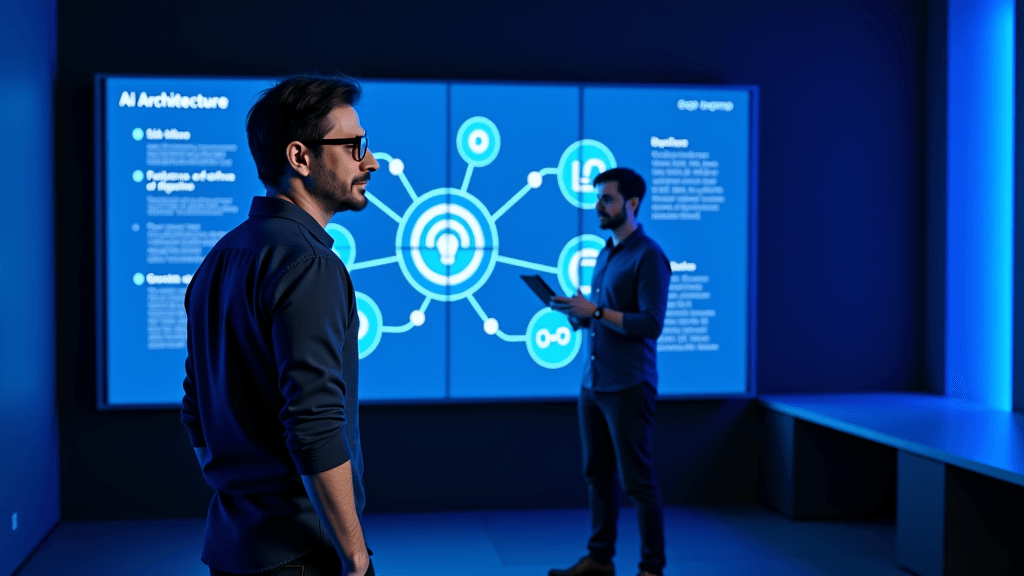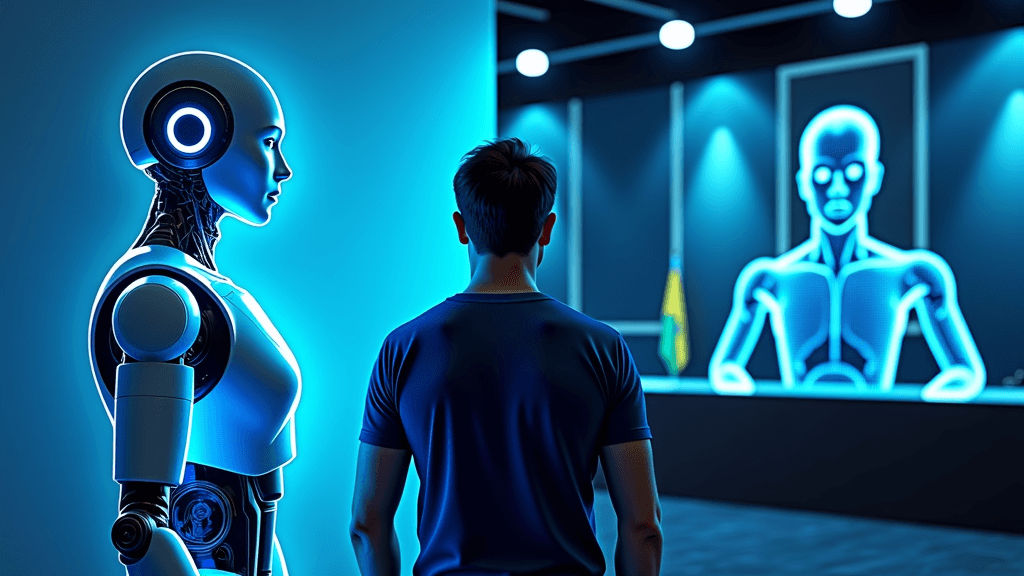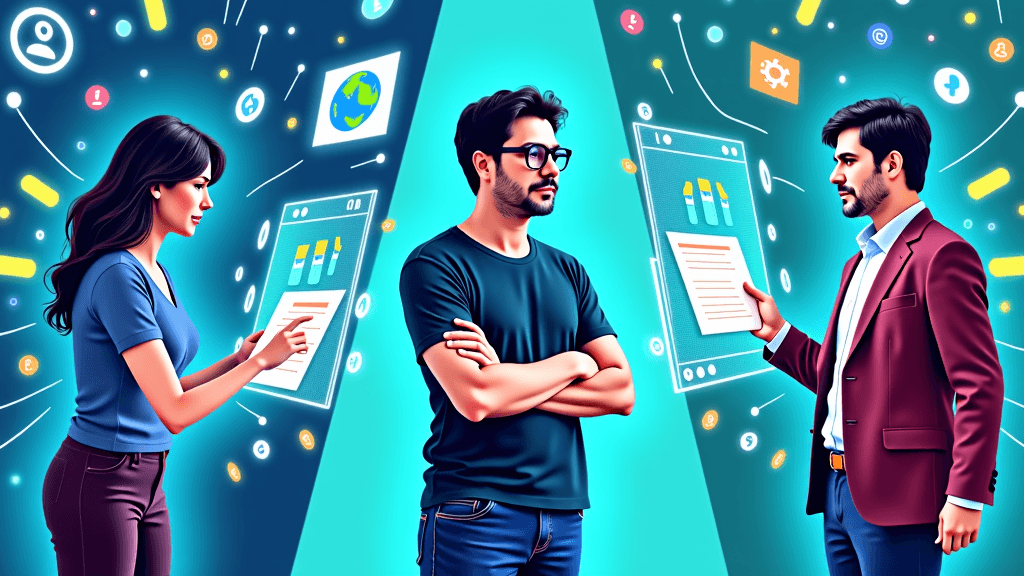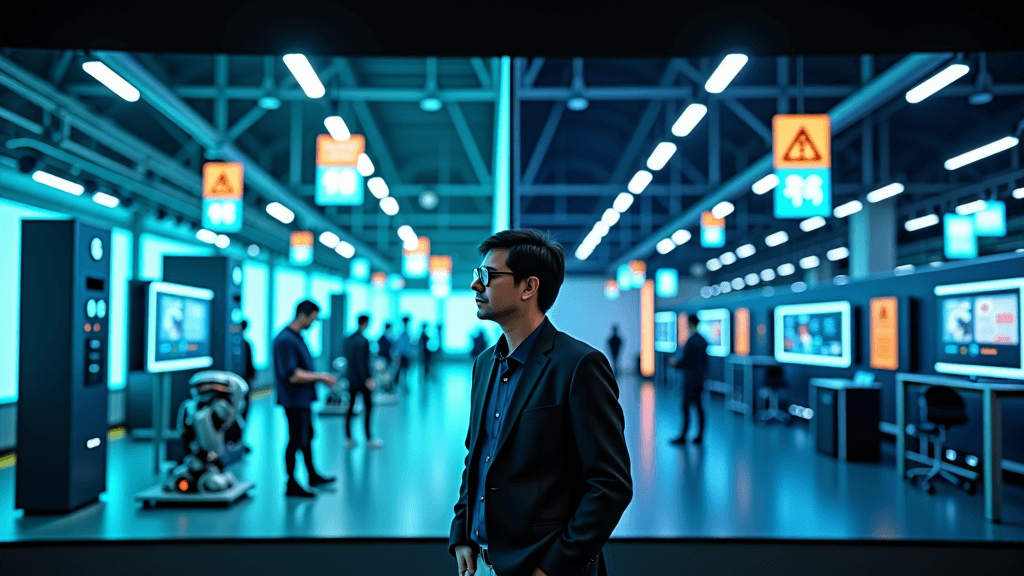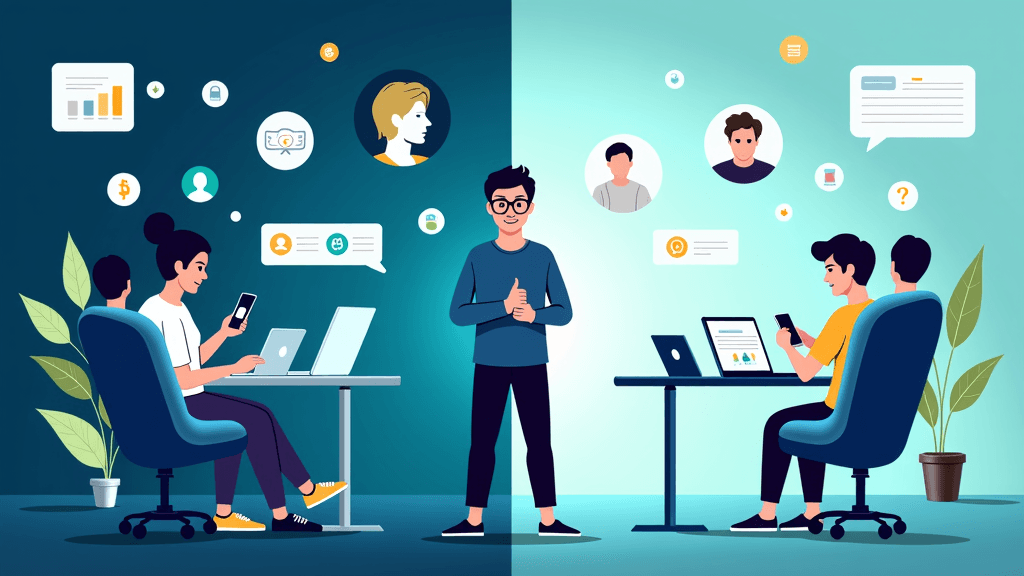All blog posts
Insights on startups, AI, innovation, the future of work and technology education. Practical strategies for impact businesses and digital transformation.
As últimas 24 horas trouxeram duas notícias sobre o Google que, juntas, expõem uma contradição fundamental na governança de IA: de um lado, a acusação de um ex-funcionário de que a empresa violou suas próprias diretrizes éticas ao apoiar tecnicamente aplicações militares de vigilância em Israel; de outro, o lançamento do Genie 3, uma ferramenta capaz de gerar mundos digitais interativos a partir de prompts simples, causando pânico no mercado de videogames com quedas expressivas de até 21% em ações de grandes companhias.
Essas duas histórias não estão desconectadas. Elas revelam o mesmo padrão: empresas de tecnologia avançam rapidamente na criação de capacidades poderosas, mas a governança interna — aquela que deveria garantir o uso ético e seguro — não acompanha o ritmo. E isso tem consequências diretas para trabalhadores, indústrias inteiras e, claro, para a confiança pública.
Vamos mergulhar nos fatos, entender o que está em jogo e, principalmente, refletir sobre o que isso significa para quem trabalha com tecnologia, para quem lidera empresas e para quem depende da IA para construir o futuro.
Google Acusado de Apoiar IA Militar em Israel — A Fronteira Ética em Questão
According to a report by Washington Post, um ex-funcionário do Google apresentou uma denúncia confidencial à Comissão de Valores Mobiliários dos Estados Unidos (SEC) em agosto de 2024, alegando que a empresa prestou apoio técnico para o uso de IA na análise de imagens de drones por um fornecedor militar israelense.
A acusação é específica: equipes do Google teriam ajudado um contratado das Forças de Defesa de Israel (IDF) a aprimorar o desempenho do modelo Gemini na identificação de alvos como drones, veículos blindados e soldados em vídeos de vigilância aérea. A solicitação teria partido de um endereço de e-mail vinculado ao IDF e estaria associada à empresa israelense CloudEx, apontada no processo como prestadora de serviços ao Exército israelense.
O ponto central da denúncia não é apenas técnico, mas jurídico e ético: na época, os princípios públicos de IA do Google proibiam explicitamente o uso da tecnologia em aplicações ligadas a armamentos ou a sistemas de vigilância que violassem normas internacionais. O denunciante argumenta que o apoio técnico prestado contradiz essas políticas e, ao fazê-lo, teria induzido investidores e reguladores ao erro — uma violação potencial das leis de valores mobiliários dos EUA.
O Google negou veementemente as acusações, afirmando que respondeu apenas a uma dúvida genérica, sem oferecer suporte técnico aprofundado, e classificando a denúncia como “leviana”. Em fevereiro de 2025, a empresa revisou suas diretrizes éticas, retirando proibições explícitas sobre aplicações militares — um movimento que, por si só, já havia gerado controvérsia interna e externa.
Por Que Isso Importa Além do Google?
Essa história não é apenas sobre uma empresa específica. Ela reacende um debate fundamental: até que ponto as big techs podem declarar princípios éticos e, ao mesmo tempo, operar em zonas cinzentas onde a pressão comercial, geopolítica e estratégica podem flexibilizar esses mesmos princípios?
No meu trabalho com empresas e governos, vejo constantemente a dificuldade de implementar governança de IA de forma genuína. Não basta ter um documento bonito com “AI Principles”. É preciso criar estruturas internas de auditoria, processos de aprovação rigorosos e, principalmente, uma cultura que permita que funcionários questionem decisões sem medo de retaliação.
O caso levantado pelo ex-funcionário do Google — se confirmado — revela uma falha sistêmica: a de que a ética em IA pode ser tratada como marca corporativa, e não como compromisso vinculante. E isso corrói a confiança não apenas em uma empresa, mas em todo o ecossistema de IA.
Genie 3 do Google: A Ferramenta Que Fez Ações de Games Despencarem
Enquanto isso, na frente de produtos, o Google DeepMind apresentou o Genie 3, uma ferramenta de IA capaz de gerar mundos digitais interativos a partir de prompts de texto ou imagens estáticas. Em demonstrações públicas, o sistema recriou cenas que lembram títulos consagrados como Fortnite, Dark Souls and Grand Theft Auto (GTA), produzindo clipes interativos de 30 a 60 segundos onde o usuário pode controlar um personagem via teclado (W, A, S, D).
A reação do mercado foi imediata e brutal. Segundo a InfoMoney, as ações da Take-Two Interactive (criadora de GTA) caíram 10%, a plataforma de jogos online Roblox despencou mais de 12%, e a Unity Software teve queda de 21%.
Profissionais da indústria apontam que, apesar do avanço impressionante, a tecnologia ainda está longe de produzir um jogo completo de padrão AAA — com narrativa complexa, física robusta, multiplayer estável e monetização escalável. Mas a demonstração foi suficiente para assustar investidores, que começaram a precificar o risco de disrupção em uma indústria que movimenta bilhões globalmente.
O Que o Genie 3 Realmente Significa?
Vamos separar o hype da realidade. O Genie 3 é uma prova de conceito poderosa, mas ainda limitada. Ele gera clipes curtos, com física aproximada e ausência de mecânicas de jogo complexas. A ferramenta está disponível apenas para assinantes do plano Google AI Ultra nos EUA.
Mas aqui está o ponto que importa: mesmo que o Genie 3 não substitua estúdios de jogos amanhã, ele sinaliza a direção da tecnologia. Em poucos anos, é provável que ferramentas de IA generativa permitam que pequenas equipes — ou até indivíduos — criem experiências interativas complexas com uma fração do custo e do tempo atuais.
Isso não elimina a indústria de games. Mas muda profundamente o modelo de negócio, a estrutura de custos e, principalmente, quem tem acesso aos meios de produção. E isso é algo que venho defendendo há anos: a IA pode democratizar a criação, mas também concentra poder se apenas algumas empresas controlam as ferramentas mais avançadas.
Outro ponto crítico: há riscos jurídicos claros. O Genie 3 foi treinado, presumivelmente, com imagens e dados de jogos existentes. Isso levanta questões sobre propriedade intelectual, direitos autorais e o uso de conteúdo protegido para treinar modelos generativos — um debate que ainda não foi resolvido nos tribunais e que promete anos de disputas legais.
Demissões em Massa Atribuídas à IA: Será Verdade ou AI-Washing?
Em paralelo, vimos crescer o fenômeno do “AI-washing” — empresas justificando demissões em massa com a futura implementação de IA, mesmo sem ter aplicações maduras prontas. Segundo reportagem do Globo/The New York Times, a IA foi citada em anúncios de mais de 50 mil demissões em 2025.
Exemplos incluem a Amazon, onde o CEO citou redução do quadro corporativo com IA, mas focou principalmente em burocracia; a Pinterest, que cortou 15% da equipe para realocar recursos para IA; e a HP, que anunciou cortes previstos ligados à incorporação de IA.
Analistas sugerem que o AI-washing é uma forma de sinalizar ao mercado que a empresa está adotando IA e encontrando economias — uma mensagem amigável para investidores — em vez de admitir dificuldades financeiras. Um estudo da Forrester indica que muitas empresas que fazem cortes relacionados à IA não têm aplicações maduras prontas. Outro estudo do Yale Budget Lab concluiu que a IA ainda não alterou significativamente o mercado de trabalho como um todo, e grande parte dos cortes recentes reflete a correção pós-contratações da pandemia.
O Que Realmente Está Acontecendo com o Emprego?
Vou ser direto: a IA está impactando o trabalho, mas não da forma simplista que muitas manchetes sugerem. Segundo análise do The Economist, o impacto maior está sendo sentido em vagas júnior — especialmente em áreas como engenharia de software e atendimento ao cliente, onde tarefas repetitivas e burocráticas podem ser automatizadas.
Estudos mostram grandes quedas no emprego nos EUA para jovens de 22 a 25 anos nessas áreas. O motivo é claro: a IA pode realizar os trabalhos burocráticos e repetitivos tradicionais desses iniciantes de forma mais barata.
Mas há nuances importantes. Especialistas indicam motivos para gestores não cortarem vagas júnior indiscriminadamente:
- Incerteza sobre o impacto a longo prazo da IA: A tecnologia ainda está em evolução rápida, e cortar toda a base de talentos pode significar ficar sem pipeline de liderança futura.
- O risco de perder reserva de talentos: Empresas que cortam demais hoje podem não ter como trazer novos profissionais quando a demanda voltar.
- Os jovens tendem a usar mais IA: Dados da OpenAI indicam que pessoas de 18 a 29 anos têm mais do dobro de probabilidade de usar ChatGPT no trabalho que os acima de 50 anos.
Na advocacia, por exemplo, a IA pode liberar estagiários para tarefas mais complexas, como negociação com clientes, em vez de apenas revisar documentos. Isso não elimina o estagiário — mas transforma radicalmente o que se espera dele desde o primeiro dia.
No meu trabalho de mentoria com executivos e empresas, insisto: a IA não elimina empregos automaticamente, mas redefine competências exigidas. Quem lidera precisa investir em formação contínua, criar espaços para experimentação segura e, principalmente, ter transparência sobre o que está mudando e por quê.
Apple Perde Talentos de IA Para Meta e Google — A Guerra de Cérebros Esquenta
Outro movimento importante das últimas 24 horas foi a debandada de talentos de IA da Apple, com a saída de pelo menos quatro pesquisadores (Yinfei Yang, Haoxuan You, Bailin Wang, Zirui Wang) e o executivo da Siri, Stuart Bowers, para concorrentes como Meta e Google DeepMind.
A insatisfação dos funcionários, segundo fontes, se deve em parte à decisão da Apple de terceirizar parte da tecnologia de IA para o Google para impulsionar recursos como o aprimoramento da Siri. Isso gerou frustração interna, já que pesquisadores de ponta querem trabalhar em times que desenvolvem tecnologia proprietária, não apenas integram soluções de terceiros.
A perda de talentos pesa nos esforços da Apple para se recuperar na corrida da IA, apesar de lucros expressivos com o iPhone. Houve uma reorganização interna no ano passado, com Tim Cook transferindo a liderança de IA para Craig Federighi e contratando Amar Subramanya (ex-Google/Microsoft) para reforçar a área.
O Que Isso Diz Sobre a Competição em IA?
Estamos vendo uma guerra de talentos sem precedentes. Meta, Google, OpenAI, Anthropic e outras empresas estão competindo ferozmente por pesquisadores de ponta, oferecendo salários milionários, equity significativo e, principalmente, autonomia para trabalhar nos problemas mais desafiadores da área.
A Apple, tradicionalmente uma empresa de produtos integrados e secretismo rigoroso, está tendo dificuldade para competir nesse modelo. Pesquisadores de IA querem publicar papers, participar de conferências e ver suas contribuições reconhecidas publicamente — algo que a cultura de sigilo da Apple dificulta.
Isso cria um dilema estratégico: a Apple pode continuar terceirizando capacidades críticas de IA (como faz com o Google para a Siri), mas isso a torna dependente de concorrentes diretos. Ou pode investir massivamente em construir capacidade interna, mas enfrentará concorrência brutal por talentos em um mercado onde os melhores pesquisadores são raros e caríssimos.
Para empresas brasileiras e latino-americanas, essa guerra de talentos também tem implicações. Precisamos investir em formação de alto nível em IA localmente, criar ambientes de pesquisa competitivos e, principalmente, oferecer propósito e impacto social como diferencial — algo que muitas vezes as big techs não conseguem proporcionar.
Moltbook: A Rede Social de Agentes de IA e os Riscos de Segurança
Uma das histórias mais curiosas das últimas 24 horas foi o lançamento do Moltbook, uma rede social exclusiva para agentes de IA, onde bots de código aberto (agora chamados OpenClaw) trocam ideias em formato de fórum, similar ao Reddit, com posts, comentários e votações.
Criado por Matt Schlicht, o projeto viralizou rapidamente, atraindo atenção de figuras como Andrej Karpathy. Humanos são bem-vindos apenas para observar, não para participar diretamente — embora precisem configurar e registrar seus agentes.
Mas o projeto também levanta sérias preocupações de segurança. Especialistas alertam que esses agentes frequentemente têm acesso amplo a arquivos, e-mail e armazenamento na nuvem dos usuários. Isso facilita ataques de “injeção de prompt” para obter dados sensíveis ou manipular os agentes para executar ações indesejadas.
Relatórios da SOC Prime indicaram que instalações do OpenClaw (anteriormente Moltbot/Clawdbot) eram acessíveis pela internet, com autenticação fraca e gravação de credenciais em texto simples, permitindo roubo de dados.
O Que Essa Experiência Revela?
O Moltbook é uma exploração criativa e filosófica: o que acontece quando agentes de IA interagem entre si, sem intervenção humana constante? Podem emergir padrões interessantes, colaborações inesperadas ou, no pior cenário, loops de desinformação e comportamentos adversariais.
Mas a questão de segurança é real e urgente. Agentes de IA com acesso amplo a sistemas críticos representam um vetor de ataque novo e poderoso. No meu trabalho com empresas, sempre insisto: antes de dar a um agente de IA acesso a e-mail, CRM ou sistemas financeiros, é preciso implementar camadas de autenticação, auditoria e limites claros de atuação.
Essa não é uma preocupação futurista. É uma necessidade imediata para qualquer organização que está experimentando com agentes autônomos.
Google Reescreve Manchetes com IA no Discover — E Editores Perdem Controle
Outra movimentação importante foi o anúncio de que o Google está implementando permanentemente um recurso de IA no feed Discover que reescreve manchetes dos editores, chamando-as de “manchete de visão geral”.
Apesar de o Google citar boa satisfação do usuário, as manchetes geradas por IA frequentemente apresentam imprecisões ou deturpam o conteúdo original. O Google também usa IA generativa para o Web Guide no Search Labs, que agrupa resultados com legendas resumidas por IA, achatando a voz dos editores.
Um exemplo de resumo de IA citou: “Os encaminhamentos globais do Google Search para editores caíram 33% (38% nos EUA) em um ano. Os encaminhamentos do Google Discover também diminuíram 21%.”
Essas práticas representam uma intermediação crescente do Google entre a busca e o conteúdo jornalístico, reduzindo o espaço para os editores se apresentarem diretamente ao público.
Por Que Isso É um Problema Estrutural?
Quando uma plataforma como o Google reescreve manchetes de editores — mesmo que com boas intenções de simplificar ou adaptar para o contexto — ela assume o papel de editor, não de distribuidor. Isso cria responsabilidade editorial que o Google historicamente rejeita.
Além disso, o impacto econômico é direto: se os encaminhamentos caem 33%, os editores perdem receita publicitária, assinantes em potencial e, principalmente, controle sobre como suas histórias são apresentadas ao público.
No ecossistema de mídia brasileiro, isso é ainda mais crítico. Veículos de imprensa já enfrentam dificuldades financeiras estruturais. Se plataformas de tecnologia intermediam o acesso ao conteúdo de forma opaca e algorítmica, a sustentabilidade do jornalismo independente fica comprometida.
Brasil se Destaca em Regulação de IA Eleitoral — Mas TSE Vê Desafios
Por fim, uma notícia positiva: segundo o Poder360, o Brasil se destaca internacionalmente, com o TSE (Tribunal Superior Eleitoral) à frente ao estabelecer regras eleitorais específicas para IA, como proibição de deepfakes em campanhas e rotulagem obrigatória de conteúdo gerado por IA.
O modelo brasileiro se assemelha ao EU AI Act (União Europeia), que classifica o risco de IA em processos democráticos. No entanto, especialistas alertam que a capacidade institucional do TSE para aplicar essas regras avançadas ainda precisa de amadurecimento técnico, especialmente na identificação de conteúdos falsos produzidos por IA.
O Que Isso Significa Para as Eleições de 2026?
O Brasil está, de fato, na vanguarda da regulação de IA em contextos eleitorais. Isso é um avanço significativo. Mas a implementação prática é o grande desafio. Detectar deepfakes sofisticados em escala, identificar conteúdo gerado por IA e aplicar sanções em tempo real durante uma campanha eleitoral são tarefas tecnicamente complexas.
Precisamos de investimento em capacitação técnica para equipes do TSE, parcerias com universidades e empresas de tecnologia, e, principalmente, transparência sobre como as ferramentas de detecção funcionam — para que não se tornem caixas-pretas que tomam decisões sem prestação de contas.
No meu trabalho com governos e entidades de apoio, defendo que a regulação de IA precisa ser acompanhada de investimento em infraestrutura técnica e formação de equipes. Caso contrário, corremos o risco de ter leis avançadas no papel, mas incapazes de serem cumpridas na prática.
O Que Essas 24 Horas Revelam Sobre o Estado da IA?
Se há um padrão que une todas essas histórias, é este: a tecnologia está avançando mais rápido do que a governança, a ética aplicada e a capacidade institucional de lidar com as consequências.
O Google pode ter políticas éticas declaradas, mas enfrenta acusações de violá-las sob pressão geopolítica e comercial. O Genie 3 pode gerar mundos digitais impressionantes, mas levanta questões sobre propriedade intelectual e disrupção econômica. Empresas podem justificar demissões com IA, mas muitas vezes sem aplicações maduras prontas. Agentes de IA podem interagir em redes sociais, mas com riscos de segurança significativos. O Google pode reescrever manchetes com IA, mas reduz o controle dos editores sobre seu próprio conteúdo.
E, no meio disso tudo, trabalhadores, empresas, jornalistas, desenvolvedores de jogos e eleitores precisam navegar essa transformação sem um mapa claro.
O Que Fazer Diante Dessa Realidade?
Vou oferecer três direções práticas, baseadas no que venho construindo com empresas, governos e entidades de apoio:
1. Invista em Governança de IA Real, Não Apenas em Declarações
Se você lidera uma empresa que está adotando IA, não basta ter um documento de princípios. É preciso criar processos de auditoria, comitês de ética com poder de veto, e canais seguros para que funcionários possam levantar preocupações sem medo de retaliação.
No meu mentoring executivo, trabalho com líderes para implementar estruturas de governança que sejam viáveis, auditáveis e alinhadas com a cultura organizacional. Isso não é burocracia — é construção de confiança interna e externa.
2. Prepare Suas Equipes Para a Transformação do Trabalho
A IA está redefinindo competências exigidas em praticamente todas as áreas. Mas isso não significa que o emprego vai desaparecer — significa que o que se espera de cada profissional está mudando rapidamente.
Nos meus cursos imersivos de IA, ajudo empresas a capacitar equipes para usar IA de forma crítica e produtiva, entendendo limitações, riscos e oportunidades. Isso não é sobre transformar todo mundo em cientista de dados — é sobre criar alfabetização digital real, que permita que cada profissional se adapte.
3. Exija Transparência e Responsabilidade de Plataformas e Fornecedores
Se você é editor, desenvolvedor de jogos, advogado ou qualquer outro profissional cujo trabalho está sendo intermediado ou automatizado por IA, exija transparência. Como o modelo foi treinado? Quais dados foram usados? Quais são os limites de responsabilidade?
No meu trabalho de consultoria com empresas e governos, construo frameworks para avaliar fornecedores de IA, mapear riscos e estabelecer contratos que protejam interesses de longo prazo. Isso é especialmente crítico em setores regulados, como saúde, educação e setor público.
Conclusão: A Tensão Entre Promessa e Execução
As últimas 24 horas nos lembraram que a IA é, ao mesmo tempo, uma tecnologia extraordinariamente poderosa e uma fonte de tensões profundas — entre ética declarada e prática real, entre inovação e disrupção econômica, entre automação e trabalho humano, entre transparência e caixas-pretas algorítmicas.
Não há respostas fáceis. Mas há caminhos possíveis: governança real, formação contínua, transparência exigida e, principalmente, liderança que assuma responsabilidade pelas consequências da tecnologia que implementa.
No meu trabalho diário com empresas, startups, governos e entidades de apoio, ajudo líderes e equipes a navegar essas transformações com olhar crítico, ferramental prático e, principalmente, compromisso com impacto social positivo. Se você está liderando ou participando desse processo e quer construir capacidade real — não apenas discurso — para lidar com IA de forma responsável e produtiva, vamos conversar.
Porque a IA não vai esperar que estejamos prontos. Mas podemos escolher como nos preparamos para ela.

